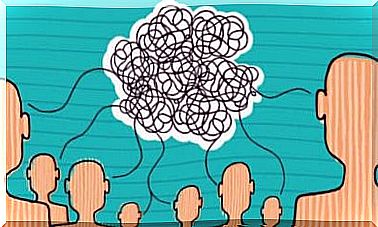Why Does Grief Become Deeper After A Toxic Relationship?

When a relationship ends, it always feels painful. Still, the grief associated with ending a toxic relationship usually feels much more complicated. This is due to the specific characteristics of these types of relationships.
When we talk about toxic relationships, we usually think of couple relationships. But every human interaction can have a detrimental dynamic. Thus, both the end of a friendship and the death of a close relative can be complicated. This is especially the case if the existing band was not healthy.

Why does grief after toxic conditions become more complicated?
It may seem quite illogical that it is more difficult to let go of people who have hurt us than those who have given us their love. Those who go through the process of ending a toxic relationship often encounter misunderstandings and judgments from the people around them. To better understand the situation, we must therefore take a closer look at certain important factors.
Personality
In general, people who end up in toxic relationships, and maintain them, have some emotional issues they need to work through. It is common for these people to have a strong fear of rejection and abandonment. It is also normal for these to be people who feel insecure, indecisive and emotionally dependent.
The relationship numbs some of these internal wounds (albeit in an unhealthy way), and the addicted person focuses all his energy on his partner. When the relationship ends, they have no choice but to confront their own internal world. They need to focus their attention back on themselves.
This means that their fears and wounds appear even stronger, which makes the situation emotionally unbearable. Let us remember the following: when we grieve, we must take care of ourselves to a great extent. But if the part of us that is going to give us support is damaged, then we will not be able to take care of ourselves adequately.
Self-esteem
One of the aspects that is most damaged when someone gets involved in a toxic relationship is self-esteem. This type of relationship, where the party experiences a great deal of suffering, undermines and destroys his self-confidence.
The self-esteem value decreases the longer the individual stays in the harmful relationship. As a result, they feel weak, inadequate, and unable to cope without the other person.
Self-esteem is important to be able to detect abuse and put a stop to it. It reminds us that we are valuable and can stand on our own two feet. It is the force that shows us that we should not tolerate any form of mistreatment, even if the consequence is loneliness.
As we mentioned above, toxic conditions destroy self-esteem. These people remain undervalued and eventually feel that they do not deserve more than they get. In addition, their confidence in their own abilities decreases so much that they can not face the dissolution of the relationship.
The focused mind that a person needs to be able to say “it’s enough now”, has been damaged by the continuous humiliation.

Inner Peace
Finally, once a relationship has been healthy, there are usually no unresolved issues that remain at the breakup. Both parties have fulfilled their roles and have given the other love, security and understanding. When their paths diverge , it is thus easier through the opportunity to focus on good memories and positive emotions.
Contrary to this, so when one mourns over toxic conditions, emotions such as anger, resentment, anger and disappointment usually emerge. In this type of relationship, the weaker party feels that their abusive partner must repay them for all their efforts and the suffering they have endured.
They have always hoped that their partner would change and pay back for all their commitment. When the relationship ends, they must abandon this hope, and the anger boils.
In addition to this, dysfunctional thoughts often arise during the grieving process. Those who have been the weaker party begin to question why they were not good enough, why the other person never loved them or what they could have done to make things different.
Negative thoughts
This often leads to negative thoughts that amplify the discomfort and make it difficult to deal with the situation effectively. However, it is not impossible to overcome grief after toxic conditions.
Grieving over a relationship is very similar to the relationship itself. In healthy and respectful relationships, the grieving process is more calm and rational.
On the other hand, after a toxic relationship, the grief will be mixed with the same suffering and despair that characterized the relationship itself.
To move forward, these individuals must undergo intensive personal counseling that enables them to re-establish the pillars of self-esteem and confidence. These two are necessary so that they can heal and not repeat the whole story again.









